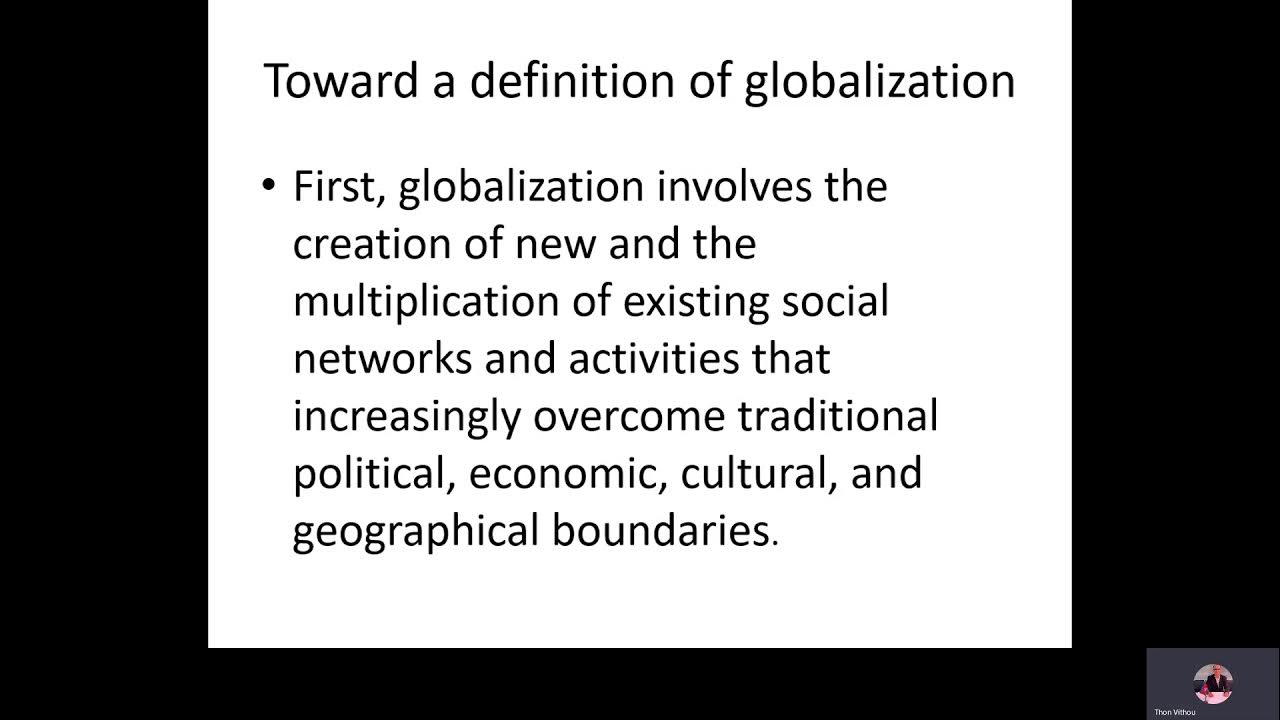Nader Mousavizadeh on Globalization 3.0
Summary
TLDRThe speaker explores the evolving nature of globalization, contrasting the integrated world of the past with a future defined by fragmentation and divergence. Through an anecdote with the Russian ambassador, the discussion highlights how nations like Russia and China are preparing to insulate themselves from Western sanctions, creating separate financial, technological, and energy systems. The video outlines the progression from globalization 1.0 and 2.0 to a contested globalization 3.0, characterized by multiple models of governance, economic management, and human rights standards. Key risks such as populism, nationalism, and protectionism are emphasized, urging leaders to adopt a more nuanced, globally-aware perspective.
Takeaways
- 🌍 Globalization is shifting from a unified model to a fragmented, multi-polar system with diverging economic and political strategies.
- 🤝 Countries like Russia and China are creating parallel systems for payments, energy trading, and technology to reduce vulnerability to Western sanctions.
- 💡 Innovation requires a balance between state control and freedom; Russia struggles to replicate the dynamic tech environment seen in the U.S. due to state oversight.
- 🏛️ Global power dynamics are increasingly influencing economic and political decision-making, moving away from the convergence seen in the post-Cold War era.
- 📉 Global trade will increasingly be negotiated through bilateral and regional agreements rather than a single overarching framework.
- 🛡️ Geopolitical tensions, such as the Russia-Ukraine conflict, are driving nations to reassess and protect their technological and economic sovereignty.
- 🌐 Globalization 3.0 is characterized by fragmentation, where different regions may adopt vastly different economic, governance, and human rights models.
- ⚖️ The rise of multiple, competing models—such as European liberalism, Chinese state-led capitalism, and Russian state-driven interests—creates a complex decision-making landscape.
- 🚨 Key risks in this new globalization include populism, nationalism, and protectionism, which are more pronounced in a contested global environment.
- 💼 Business and government leaders need to understand globalization from multiple perspectives, including those of emerging economies like India and Vietnam, to navigate the new landscape effectively.
Q & A
What anecdote does the speaker use to introduce the discussion on globalization?
-The speaker recounts a lunch in London with the Russian ambassador, where they discussed technology, innovation, and Russia's need to control its tech industry to prepare for potential Western sanctions.
Why does the Russian ambassador believe Russia cannot develop a tech industry like the U.S.?
-He believes Russia must maintain state control over its technology industry to be ready for Western sanctions, which limits the development of a dynamic, innovative tech sector similar to Silicon Valley.
How does the speaker relate the anecdote to global economic trends?
-The story illustrates that major powers, unlike the last 20 years post-Cold War, are increasingly managing economic, political, and security interests in divergent ways.
What changes in globalization does the speaker identify due to recent geopolitical events?
-The speaker notes that the Russia crisis and resulting sanctions are prompting countries like Russia and China to create alternative systems, such as separate payment networks, energy markets, and digital infrastructures, reducing reliance on the global economy.
How does the speaker define Globalization 1.0, 2.0, and 3.0?
-Globalization 1.0 is linked to the British Empire; Globalization 2.0 to the U.S. post-WWII driving a global free market; Globalization 3.0 is emerging as a fragmented system with diverging economic models, governance, and standards.
What does the speaker mean by globalization as an 'archipelago'?
-The metaphor of an 'archipelago' conveys a world divided into distinct islands of power, economic interests, governance models, and human rights standards rather than a single converging system.
What are some examples of different economic models in Globalization 3.0?
-Examples include: Europe and the U.S. with liberal economic management, Brazil with strong state intervention and social equity, China with centralized political control and rapid economic development, and Russia with a state-controlled model focused on strategic interests.
How are trade negotiations expected to change in this new form of globalization?
-Trade will increasingly be conducted through bilateral and regional arrangements rather than one global agreement, reflecting the fragmented and contested nature of Globalization 3.0.
What three major risks are associated with this new globalization?
-The three risks are populism, nationalism, and protectionism, which are more pronounced due to the greater equality among global powers and their ability to use economic strength for political ends.
Why does the speaker emphasize understanding the perspectives of countries like India and Vietnam?
-Because the new globalization involves diverse models and decision-making, business and government leaders need to understand the economic and political priorities of countries outside the traditional Western-centric model.
How does the speaker view the relationship between sanctions and technological independence?
-Sanctions motivate countries like Russia and China to develop independent technological, financial, and energy systems to reduce vulnerability to Western economic pressures.
What is the overall message regarding the evolution of globalization?
-Globalization is shifting from a unified Western-led system to a fragmented, multi-polar world where different regions pursue distinct economic and political models, requiring adaptive strategies for businesses and policymakers.
Outlines

This section is available to paid users only. Please upgrade to access this part.
Upgrade NowMindmap

This section is available to paid users only. Please upgrade to access this part.
Upgrade NowKeywords

This section is available to paid users only. Please upgrade to access this part.
Upgrade NowHighlights

This section is available to paid users only. Please upgrade to access this part.
Upgrade NowTranscripts

This section is available to paid users only. Please upgrade to access this part.
Upgrade NowBrowse More Related Video
5.0 / 5 (0 votes)





